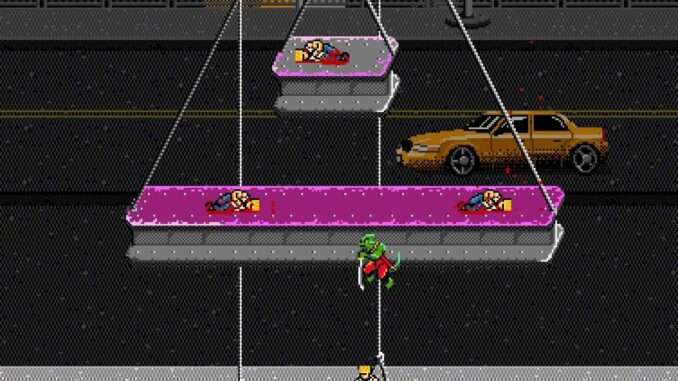
Official Game Manual and support guide for Dragon Ninja Byoka. Covers controller configurations, required Steam settings, leaderboards and system information.
Contents
Welcome to Dragon Ninja Byoka
Slice, jump and dash your way through retro platforming levels avenge your fallen master, rescue the Idol of Order and slay the Chaos Serpent.
In this Manual we will cover basic setup and tutorials on how to configure your game to get the best playable results.
Controllers and Input
Dragon Ninja Byoka supports several input modes for play
- Steam Controllers
- Generic Gamepads
- Keyboard and Mouse
Controls can be found for the current input mode in-game under Settings > Controls. Additionally, in-game Tutorials appear from time to time which include input button depictions relevant for the action specified.
Steam Controllers
Utilizing Steam Controllers is the recommended method for playing Dragon Ninja Byoka. Full Steam integration has been added for Steam Controllers allowing you to rebind inputs on your gamepad and support more controller types.
To enable any controller as a Steam Controller go to your account’s Steam Settings, General Controller Configuration and enable support for any controllers desired.
Upon enabling controller support, the official Dragon Ninja Byoka Steam Controller Configuration will be loaded. This configuration for input bindings can be overridden by you, the player, using the Steam Configuration panel.

This panel is accessible in Game under Settings by pressing the “Controls” button. It is also accessible in Steam Big Picture mode under the Game Configuration.
Generic Gamepads
If a controller is being used but is not enabled under Steam Settings, Dragon Ninja Byoka will fallback to generic gamepad support. This supports a wide range of controller models but provides no input rebinding in-game.
Controls for the game are still just as reactive as the Steam Controller and the input mappings can be viewd in-game under Settings by pressing the “Controls” button.
Keyboard and Mouse
Keyboard and Mouse inputs are always active and work regardless of controller status. Dragon Ninja Byoka is playable with Keyboard and Mouse, though the reaction and precision necessary for gameplay may make this input harder to utilize.
Keyboard and Mouse input bindings can be seen in-game under Settings by pressing the “Controls” button.
Saved Games and Configuration
Your progress through the Dragon Ninja Byoka game will be saved upon each successful level completed. When this icon is shown, do not close the game as progress or scores may be lost.

Save File Location
Saved files are stored on your PC at this location
- Windows – “Saved Games” > “Dragon Ninja Byoka”
Deleting this file will delete all progress.
Steam Cloud Saves
This game utilizes Steam Auto-Cloud to backup your save files. This allows your progress to be transmitted to different computers. Steam Cloud must be enabled for your Account and for the Game overall under Steam > Settings > Cloud and under the Game Settings in your Steam Library.
Game Configuration
The in-game Settings page supports several options for audio, graphics and gameplay. These settings are persisted on your PC in a file at:
- Windows – User Folder > AppData > Local > Dragon Ninja Byoka
Enabling or Disabling VSync can be done via the configuration file specified above. This setting will only apply at game launch and no changes made to this file while the game is running will be saved.
Replays, Races and Leaderboards
Dragon Ninja Byoka is all about precision platforming, speed and replayable levels. As such each in-game level is recorded and can be saved as a Replay to either watch or Race. Additionally, your best scores for each level are uploaded to Steam Leaderboards to be viewed or raced by the community.
Saved Recordings
To save a replay for any level you have played, on the Map End screen press “Save Recording”. Only one recording per level is supported at this time. Once a recording has been saved it can be watched or raced in-game at any time from the Map Select menu
Saved Recordings Location
Your save game file and all saved recording files can be found on your PC at:
- Windows – “Saved Games” > “Dragon Ninja Byoka”
Steam Leaderboards
Your best times are automatically uploaded to Steam Leaderboards for the level played. There are two categegories per level that are tracked:
- S Scores – best times for an S score
- Any% Scores – best times for a map’s completion regardless of score
Under Map Select > View Rankings you can review the Steam Leaderboards for any map. You can see your rankings and the top rankings. You can watch or race a recording from other players.
Steam Leaderboard Requirements
Steam Cloud must be enabled for your Account and your Game in order to participate in the Steam Leaderboards. This is because your cloud storage is used to upload your recording files to the cloud for others to view. Once they are uploaded and attached to your leaderboard entry, your cloud file is removed so as not to occupy an unncessary storage.
What happened to my recording?
During development of Dragon Ninja Byoka, new features, bug fixes or version pushes may invalidate recordings previously saved. This scenario is very uncommon, so do not worry. Recordings are based on user input and replaying the game engine using the user input recorded. If a portion of the game engine changes during development or bug fixing it may mean that a level will not play out the same way it did when you recorded the save file.
What happened to the Steam Leaderboard?
In the same scenario mentioned above, leaderboards are tied to game versions and if a new version is released that invalidates previous recordings then the old leaderboard entries will not be listed.


Be the first to comment